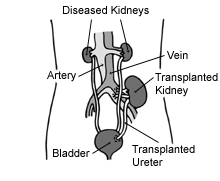Market-based organ donation: A solution to the shortages?
As I look at the Department of Health and Human Services (HHS) website for The Organ Procurement and Transplantation Network (OPTN) today, there are 123,000 people on waiting lists for organs, with the bulk of them waiting for kidneys.

Image/NIH
The unfortunate and tragic thing in the United States and in other countries, people die while waiting for organs for transplantation. In fact, according to OrganDonor.gov, an average of 18 people die each day waiting for transplants that can’t take place because of the shortage of donated organs. That adds up to 6,570 people a year.
Clearly, organ donation strictly via altruism falls short- the supply does not meet the demand.
In comes free-market economics. Long time compensated donor advocate, Nobel Prize-winning professor of economics at the University of Chicago, Gary Becker and Julio Elias from Universidad del CEMA in Argentina say compensating organ donors would save lives by increasing the supply of organs available.
In an Wall Street Journal Op-Ed earlier this year, Becker and Elias make a case for “cash for kidneys” or establishing a market for organs. The economists write, “Paying donors for their organs would finally eliminate the supply-demand gap. In particular, sufficient payment to kidney donors would increase the supply of kidneys by a large percentage, without greatly increasing the total cost of a kidney transplant.” They conclude that kidneys, both live and cadaveric, would be available for an average of $15,000 each.
Since the number of kidneys available at a reasonable price would be far more than needed to close the gap between the demand and supply of kidneys, there would no longer be any significant waiting time to get a kidney transplant. The number of people on dialysis would decline dramatically, and deaths due to long waits for a transplant would essentially disappear.
Gary Becker isn’t alone. The CATO Institute’s bioethicist, Sigrid Fry-Revere, also a long-time free market advocate said in a commentary about 10 years ago:
The solution to the organ shortage is to allow a free market in all aspects of organ and tissue procurement. Let the market do what it does best — match those with goods and services with those who need them. It would be nice if altruistic motives were enough to provide all the organs and tissues needed, but why, in a society where the exchange of money for goods and services is the norm, should people be limited to the two options of giving their bodies away or having the government take them without asking?
Let people sell their kidneys while they are alive (most people have two), and let people stipulate in their wills that they want to sell their organs, bone and other tissues at death. Insurance companies can create real incentives — financial incentives — to get people to donate. Incentives such as a partial reduction in premiums when someone signs up as a donor and the payment of funeral expenses once the organs are harvested. The real way to stop the transplant nightmare is staring us in the face. Just let people do what they naturally do — exchange money for goods and services.
Dr. Fry-Revere cites the example of Iran, yes Iran, on a organ procurement system that takes care of not only the recipient, but also the donor via a compensated system. She details this in her latest book, The Kidney Sellers.
Many readers will say compensating donors is unethical and will lead to taking advantage of the poor; however, one might ask, “How ethical is it to let 6,500 people die because of unnecessary organ shortages?” Shouldn’t this option be looked at seriously?















[…] Market-based organ donation: A solution to the shortages? […]
Anywhere from 18-30% of folks on the wait list have undergone at least one prior transplant (per SRTR), and 10% of names are duplicates. 4000 people every year die in the US with a working transplant. A recipient’s risk of cancer and cancer-related death is 10x that of a non-transplant recipient (per Wong 2014).
Transplants are not cures.
In 2002, OPTN changed their policy, allowing ‘inactives’ to stay on the wait list indefinitely. Inactives are folks who couldn’t receive a transplant even if an organ became available to them. 30% of the wait list are currently inactive (per Delmonico). 52% of deaths on the wait list are inactive. The ‘active’ kidney wait list has been flat since 2007.
Every study from every country with an illegal, quasi-legal or legal kidney market has found the paradigm to be highly detrimental to the donor/vendor/person relinquishing the kidney. INCLUDING IRAN. All studies found the kidney donor/vendor to experience increased health problems, more financial difficulties, greater psychological issues and a decreased quality of life. The vast majority of kidney donors/sellers have said they would *not* recommend someone sell a kidney. (For multiple articles, see: http://livingdonorsarepeopletoo.com/category/organ-markets/)
The average age of end-stage renal disease onset in the US is 64.4 years old (per USRDS). 44% of kidney failure is caused by diabetes; another 26% by hypertension. The US population is aging and getting more obese. Unless many things change, supply will never keep up with demand. The only true way to address the issues of kidney disease and failure is through robust prevention and treatment programs.
And finally, I notice there’s no mention of the risk of living kidney donation to donor, as if a kidney is a pint of blood. In fact, 4.4 living kidney donors die every year in the US within 12 months of donating (per OPTN). 20% experience complications, including: hernia, nerve damage, chylous ascities, adrenal dysfunction, testicular sensitivity and swelling & pancreatitis. 20-30% suffer from depression, anxiety, grief, anger and/or PTSD (and not a single transplant center offers structured aftercare or support services). We have *no* comprehensive short or long-term data on the health and well-being of living kidney donors despite a federal mandate, because neither OPTN nor CMS has bothered to enforce it. In fact, OPTN (whose membership is composed of transplant centers & others who financially benefit from transplants) has vociferously fought standards of care for living donors, or any attempt to hold them responsible for their treatment of them. If you’re interested in writing about the deficits of the US transplant industry, you might try writing about that.
I wonder, have any of the people promoting a legalized kidney market donated a kidney themselves? Because it seems to me that if they’re really concerned about folks with end-stage renal disease, and if they truly believe in the low-risk nature of living donation, they would’ve stepped forward to donate themselves. That they haven’t undermines the the courage of their convictions.
http://www.livingdonor101.com